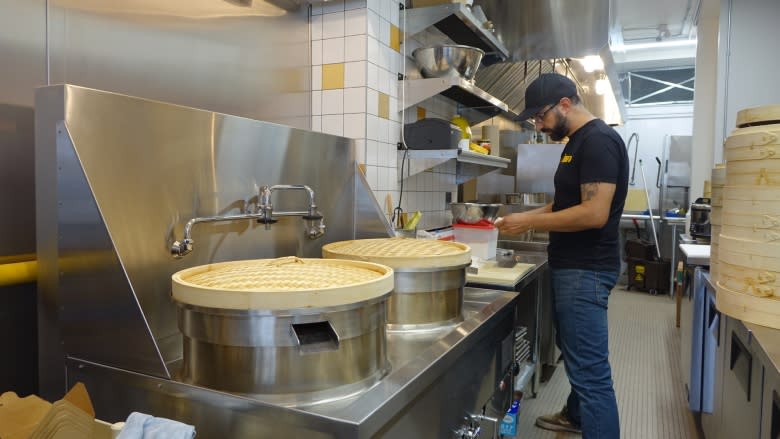Truck rules stifling city's food scene, restaurateur says
A former food cart operator who now runs a bricks-and-mortar restaurant says the city's strict rules aimed at controlling competition are stifling culinary creativity and leaving Ottawans hungry for more variety.
Tarek Hassan, chef and co-owner of Gongfu Bao, told CBC Radio's Ottawa Morning he would be fine with seeing a food truck pull up around the corner from his new Bank Street restaurant, something that's currently prohibited.
"I honestly feel like someone offering something compelling and worthwhile, and I'm doing my best to offer something compelling and worthwhile, if we both are in the neighbourhood, I think that's going to be more of a draw and more business in the neighbourhood," Hassan said.
Five years after the city implemented a program to expand street food offerings, the number of mobile food vendors has declined — a move the city attributes to vendors "pursuing other opportunities," rather than an issue with the system.
46-metre rule
The City of Ottawa's 2013 food truck program restricted both the number of vendors and where they could set up shop.
The program established on-street spots for vendors to sell meals between 11 a.m. and 5:30 p.m. Each approved vendor has a designated permit for a specific spot that must be at least 46 metres from any other food provider, including restaurants.
While Hassan said the strict rules didn't affect his sales, he lamented about the effect on food trucks who need "a little more room to breathe."
"I feel that those rules, and that kind of model, are driven by competition mindset, rather than trying to think about critical mass and the potential of offering more to a neighbourhood and bringing more people to the neighbourhood," Hassan said.
The rule also risks fuelling an "us versus them" mentality between restaurateurs and street vendors, he said.
Food truck numbers declining
The 46-metre rule also came under fire from the Competition Bureau, which urged municipalities including Ottawa to take a "softer approach" by relaxing rules that inhibit competition and shrinking prescribed buffer zones between vendors and restaurants.
The number of permits dropped from 32 in its inaugural year to 25 last year — numbers which include chip trucks and hot dog stands which were in operation before the start of the program.
For the current year the city has issued 29 permits, although at least two trucks on the list have no plans to reopen this season.
Last year the Competition Bureau told CBC 11 of the licences available from the city remained up for grabs. This week the city told CBC it's unable to say how many licences are currently available.
Cart helped establish brand
The Gongfu food cart was given a spot at the corner of Elgin and Slater streets, and also set up at farmers markets around town.
Hassan said he wouldn't be opening up a restaurant if he hadn't had the experience of running a food cart first.
"It's always surprising for me to see restaurants start out of the blue. It's such a big investment," he said. "For me the cart … was a way to take an iterative approach to starting a food business."
Being a street food vendor helped him learn and develop the Gongfu brand, he said.
"Our recipes and our menu offerings went through a lot of transitions," Hassan said. "And the bao itself continues to get refined."
The restaurant is open evenings from Thursday to Sunday, and Hassan said he expects to expand his hours of operation in late August.



